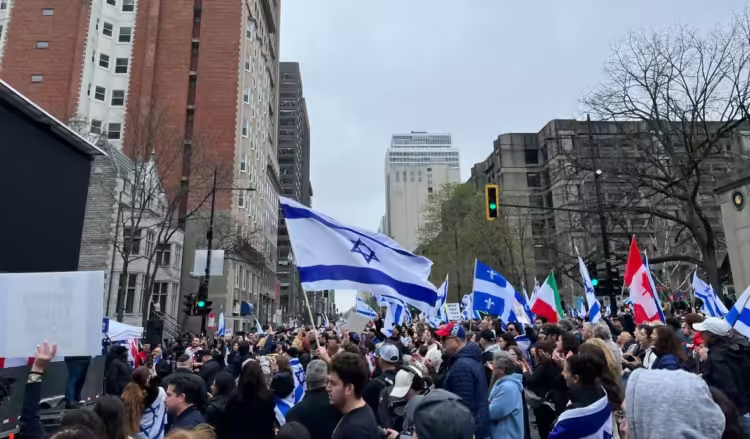Two opposing protests faced off outside McGill University in downtown Montreal Thursday afternoon, where a pro-Palestinian encampment set up on Saturday remains in place.
The students in the encampment are demanding McGill divest from companies with business ties to Israel.
The encampment occupies a space of several thousand square meters on the university’s large front lawn on Sherbrooke Street. It started with 20 tents and has grown significantly since the weekend, with many supporters showing up every day in addition to those camping there every night.
A pro-Israel demonstration was organized in response to the encampment Thursday. Those protesters stood outside McGill’s Roddick Gates, which were blocked by Montreal police on bicycles and horseback.
The demonstrators arrived at around 12:30 p.m. and waved Israeli flags and held signs saying “Release the hostages,” and “Bring them home now.” They played music in Hebrew and set up a large screen in front of the campus, where they played interviews from women who said they had experienced sexual violence at the hands of Hamas on Oct. 7.
On the other side of the police line and the campus fence, a line of pro-Palestinian demonstrators, many of them members of the advocacy group Independent Jewish Voices, chanted slogans including “Jews against genocide,” and “In our lifetime, we will see Palestinians living free.”
Organizers repeatedly asked people not to crowd the campus’s main walkway and to stay away from the street.
“Do not talk to Zionists, whatsoever. Do not engage,” a man with a keffiyeh covering his face said in a microphone.
The pro-Israel demonstration of several hundred people wrapped up shortly after 3 p.m., after which Sherbrooke Street reopened to traffic.
An injunction request to remove the encampment filed in Quebec Superior Court by two McGill students was rejected Wednesday by Justice Chantale Masse, who said the plaintiffs failed to show it caused them irreparable harm.
In her ruling, Masse wrote that if the injunction request were granted and protesters were removed, their “freedom of expression and to gather peacefully would be affected significantly.”
Niall Clapham Ricardo, a Université du Québec à Montréal (UQAM) student in international law who is part of Independent Jewish Voices, said people at the encampment had “put out a call for solidarity” in anticipation of the planned counter-protest and following aggressive police interventions and widespread arrests at similar encampments at UCLA and Columbia University.
“There’s not going to be no confrontation on our side. We are here just to show that we have the right to be here. We have the right to be heard, and the students have the right to call for the divestment of the universities,” said Ricardo.
“We’re going to keep on fighting until Palestine is free and until the genocide stops in Gaza.”
For several days, McGill has been attempting to pressure protesters into dismantling the encampment. Earlier this week, the university requested “police assistance” and lent its name to the injunction request to force them to leave.
The encampment is one of many protests taking place on university campuses across North America that are in response to the growing death toll in the Gaza Strip.
Since Israel launched its military offensive in the Palestinian enclave last October, more than 34,000 people have been killed, according to the Hamas-run Health Ministry. Israel’s ongoing operation is in response to a Hamas-led attack in southern Israel which killed about 1,200 people and captured 250 hostages, according to Israeli officials.
The two protests appeared to try and drown each other out, with chanting and drumming on the encampment side and loud, upbeat music from the pro-Israel side.
Jamie Fabian, a McGill law student, spoke to the crowd of pro-Israel protesters, saying the use of the word “intifada” by encampment protesters was a call for violence.
“We don’t use violence when faced with violence,” Fabian told the crowd. “Jewish people are indigenous to Israel. For us, it’s not a question of politics, but a question of the survival of our people.”

 English
English



























































